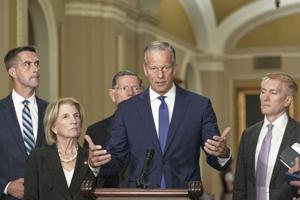A significant political showdown is brewing in Washington as Senate Republicans consider an aggressive move to overhaul the chamber’s rules, aiming to accelerate the confirmation process for President Donald Trump’s numerous executive branch nominees. This potential shift sets the stage for a heated political clash with Democrats, who are currently employing delaying tactics to scrutinize the administration’s picks.
Despite Senate Majority Leader Mitch McConnell having significantly increased the pace of confirmations during Trump’s first term by extending legislative sessions, the President continues to demand swifter action. Democrats, however, have steadfastly delayed votes on many nominees, asserting that Trump’s selections are often extreme and warrant meticulous review, leading to the current gridlock in US Politics.
Senator John Thune, a prominent Republican, voiced the growing sentiment within the GOP conference, stating, “We may need to look at doing things differently on nominees generally if the Democrats continue on this path of obstruction.” He indicated that support for changing Senate Rules to bypass Democratic delays is rapidly solidifying on their side of the aisle, underscoring the high stakes involved for Trump Nominees.
This intensifying standoff, fueled by Trump’s public encouragement for Republicans to expedite confirmations or even forgo their August recess, is expected to reach a critical point in the coming days. Democrats show little inclination to concede to demands for a swift tranche of confirmations before their break, even as senators from both parties are eager to depart after a grueling period of work and acrimonious partisan battles.
While the Senate confirmation process has always been a point of contention, the intensity of these disputes has escalated dramatically over the last two decades. Both parties have increasingly resorted to procedural maneuvers to delay confirmations that were once considered routine. Notable precedents include Democrats’ “nuclear option” in 2013 to lower the 60-vote threshold for judicial nominees and Republicans’ similar move in 2017 for Supreme Court Justice Neil Gorsuch.
Nonetheless, Democrats this year have significantly heightened their obstruction, denying nearly all unanimous consent votes and compelling lengthy roll-call votes for each nominee. This strategy, unprecedented in recent history for a minority party, allows for extensive debate time, prolonging the confirmation of key Trump Nominees and frustrating the GOP’s agenda. Senate Democratic Leader Chuck Schumer defended these actions, citing that “historically bad nominees deserved historic levels of scrutiny.”
Thune countered that Democrats are “misusing” the existing Senate Rules, arguing that a change could ultimately benefit both parties when they hold the presidency. Potential alterations being considered by Senate Republicans include reducing procedural votes, eliminating or shortening the standard two hours of debate time per nominee, or bundling multiple nominations for a single vote. Such a rule change would require a simple majority, meaning nearly all 53 Republican senators would need to be unified.
Despite the potential long-term benefits, Democrats are highly unlikely to support any moves to restrict debate or streamline the confirmation process. Democratic Senator Richard Blumenthal of Connecticut warned that eliminating debate time would constitute “resisting scrutiny” for a president’s nominations. Even Senator Tim Kaine, a Democrat who has previously expressed openness to reducing the number of Senate-confirmed positions, maintains firm opposition to cutting debate time for nominees.
Adding further pressure, President Trump has publicly urged Senate Republicans to cancel their August recess and has criticized the traditional “blue slip” process on social media. In a recent Truth Social post, Trump implored Senate Judiciary Committee Chairman Chuck Grassley to discontinue honoring blue slip forms from home-state senators, claiming this “custom” only allows Democrats or “weak” Republicans to get nominated. Grassley, however, publicly defended the practice, expressing his offense at the President’s personal insults, a sentiment echoed by Thune, who stated he does “not sense any rush to change it.”






Leave a Reply